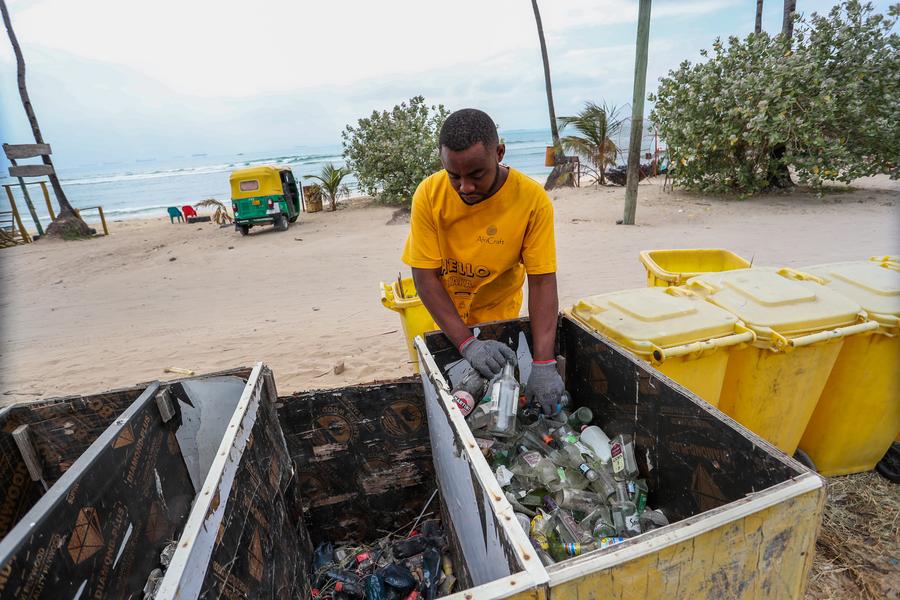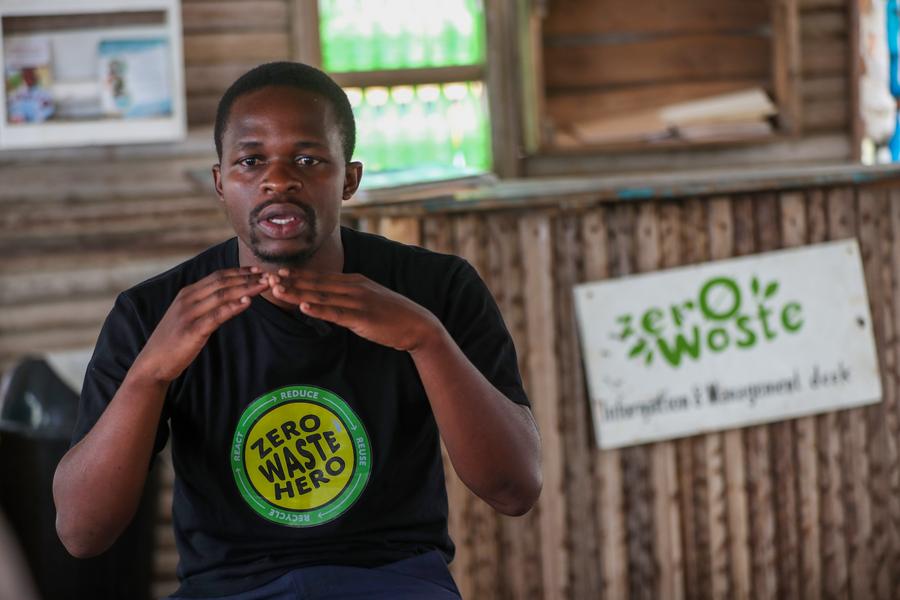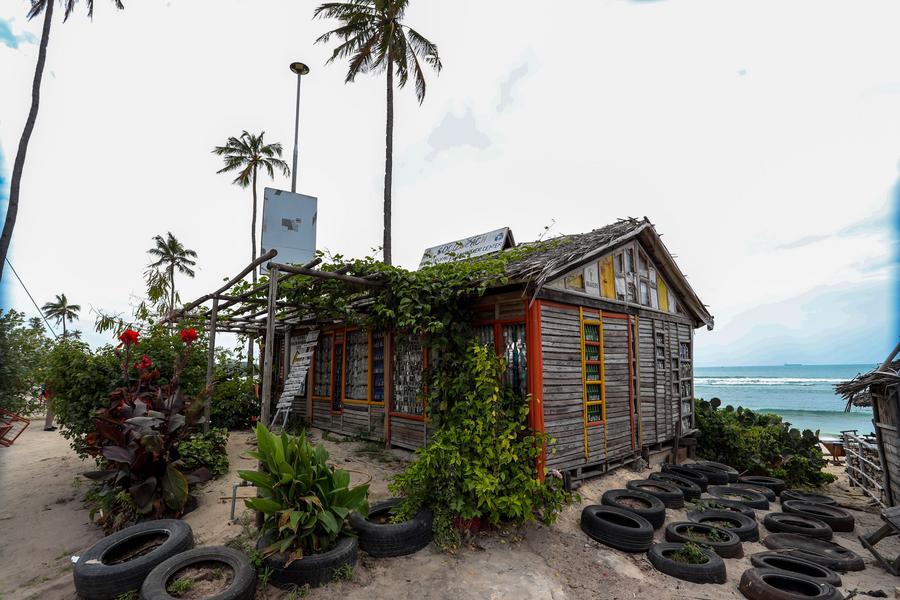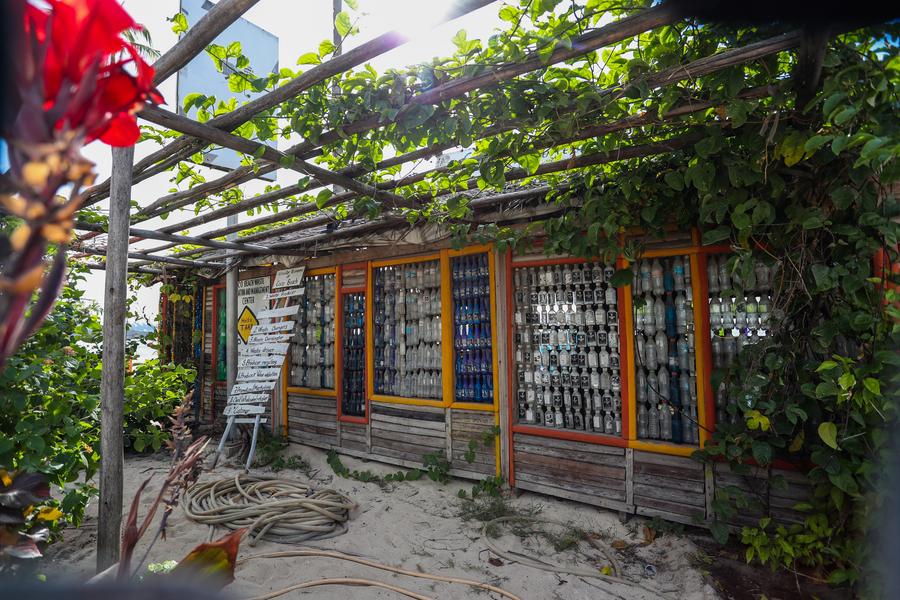
 A team member of Africraft's waste management project sorts collected waste on Coco Beach in Dar es Salaam, Tanzania, on July 30, 2025. (Xinhua/Emmanuel Herman)
A team member of Africraft's waste management project sorts collected waste on Coco Beach in Dar es Salaam, Tanzania, on July 30, 2025. (Xinhua/Emmanuel Herman)By blending sustainability with social empowerment, Africraft is transforming polluted coastlines into thriving community assets and sparking a broader national movement.
"We're transforming informal waste pickers into formal waste changers," says Robertho Vasco Njovu, Africraft's waste management project coordinator.
Twice a week -- on Mondays and Fridays -- a dedicated team of 10 youth patrol a three-km stretch of Coco Beach, collecting up to 400 kg of waste. Once street waste pickers, they now wear personal protective equipment and conduct brand audits to support marine conservation and public awareness.
Njovu spoke to Xinhua from Africraft's Waste Information and Management (WIM) Center, a structure crafted from raffia, palm leaves, bottle caps, and glass.

"The WIM Center is our command post, our hub and our classroom," Njovu explained. "It reminds us every day that when communities care, nature heals."
The predominant waste types collected include plastic bottles and packaging from water, juice, and energy drinks, as well as glass bottles from beer, wine, and spirits such as gin. Smaller plastic articles, such as bottle caps, straws, and ice cream wrappers, are also commonly found.
"Usable materials are sent to our headquarters for transformation. Items we can't repurpose go to members of the Tanzania Recyclers Association, which is more than 100 recyclers," Njovu noted.
The team practices strict segregation of hazardous materials, such as syringes, condoms, and broken glass, which are treated at a designated point and delivered to hospitals for safe disposal.
Coco Beach has undergone a remarkable transformation since 2017, when pollution and neglect posed serious threats to both biodiversity and tourism. Africraft's cleanup initiative drew community interest and sparked momentum.
"Today, the beach is cleaner, more inviting, and increasingly recognized for eco-tourism," said Njovu. "Visitors and businesses see it as a renewed destination for leisure and investment."

Africraft has also extended its reach to schools in Dar es Salaam and Zanzibar, where students learn to repurpose waste into useful products. Interactive sessions at the WIM Center include beach cleanups and crafting buckets from bottles and paper from discarded sheets, instilling environmental values through hands-on learning.
The non-governmental organization's workshop near Coco Beach has developed over 400 products from recycled material, including earrings made from coffee capsules, decorative glassware, and bracelets fashioned from beach-recovered fishnets. These products fuel local enterprise and showcase the country's creative spirit.
The Waste Changers initiative now encompasses communities across Zanzibar, Kigoma, Arusha, and the Coast regions. Over 1,000 residents have participated, and plans to expand to the Lindi region are underway. At each location, Africraft combines education, environmental recovery, and economic empowerment.

With support from the Rosa Luxemburg Foundation, Africraft champions Extended Producer Responsibility, a framework that holds manufacturers accountable for post-consumer waste. Though not yet formalized in national policy, Njovu and his team continue to advocate for systemic change.
Once riddled with glass shards, diapers, and foul smells, Coco Beach now stands as a symbol of resilience and renewal. Africraft's tireless efforts have restored its natural beauty, sparked civic engagement, and built a platform for youth-led environmental change.
"Coco Beach isn't just clean," Njovu said. "It's alive with ideas, action, and a future we can all take pride in.
















